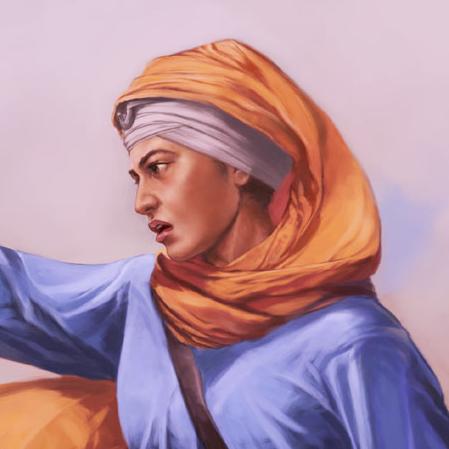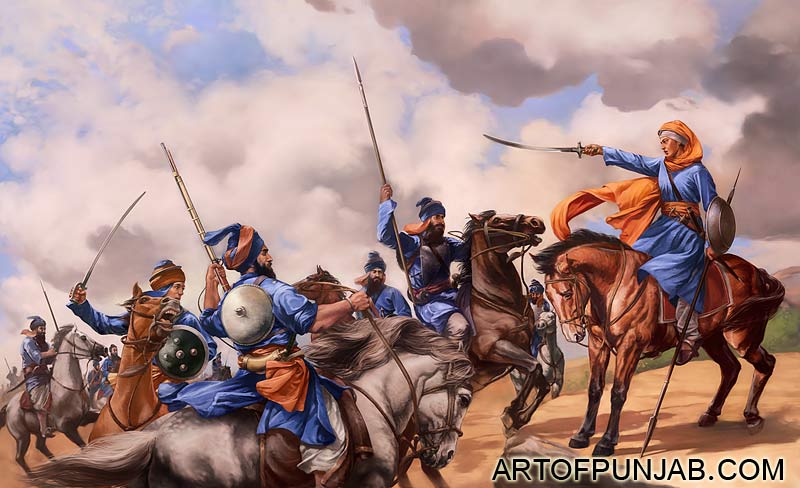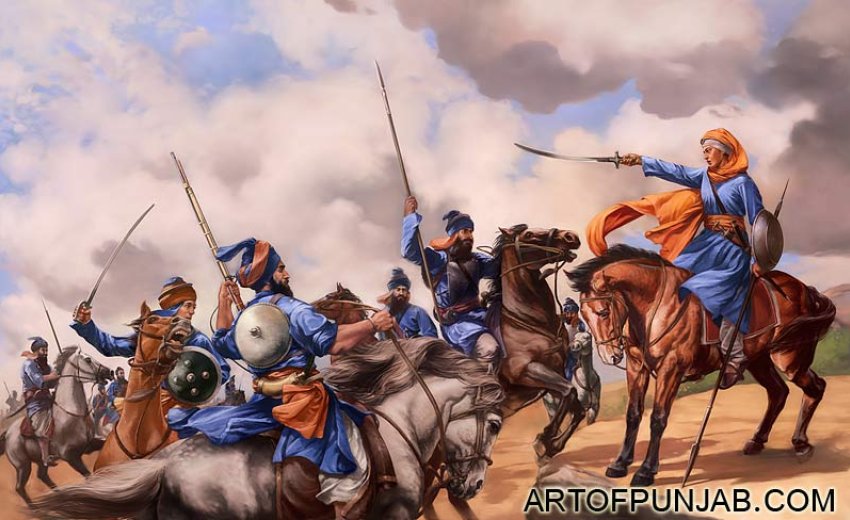 Someone who abandons his duty will do so again and again. Is life really that simple? Do we not sometimes have to do things in life that appear to be disastrous, but later turn out to be blessings in disguise? Something that needed time to mature, that could only unfold into mastering its task at a later time? Such an episode once took place between Māī Bhāgo and the Cālī Mukte. Who was Māī Bhāgo, that Sikh woman in a society otherwise dominated by men? If this story is to be told faithfully, it has to begin in Śrī Anandpur Sāhib.
Someone who abandons his duty will do so again and again. Is life really that simple? Do we not sometimes have to do things in life that appear to be disastrous, but later turn out to be blessings in disguise? Something that needed time to mature, that could only unfold into mastering its task at a later time? Such an episode once took place between Māī Bhāgo and the Cālī Mukte. Who was Māī Bhāgo, that Sikh woman in a society otherwise dominated by men? If this story is to be told faithfully, it has to begin in Śrī Anandpur Sāhib.
The six-month siege of Anandpur Sāhib that Gurū Gobind Singh and his Sikhs, men, women and children, had to endure, was woeful. There was a lack of everything that could have made their lives bearable, there was only a profusion of fear of the enemies besieging them and of dejection in the face of an uncertain future. When we take these circumstances into account, the fact that forty Sikhs just wanted to get away is only human and understandable. One of the reasons for this may also have been a proclamation issued by the enemies that promised freedom to every Sikh, whether man or woman, that dissociated him- or herself from Gurū Gobind Singh and from Sikhism.
Those Sikhs, led by Mahān Singh, went to Gurū Gobind Singh to desert him and Sikhism. It is well known that in war desertion or even just the thought of it is punished heavily, often with death. But in this situation Gurū Gobind Singh Jī demonstrated his magnanimity and let the warrior give way to the Gurū. He certainly knew that in life you always meet twice, and that you can only keep what you give away. So he neither reproached the deserters nor threatened them, which may have unsettled them even more as they had not expected this reaction. The only thing Gurū Jī demanded of them was that they sign a document, called Bedāvā, that confirmed their renunciation of him and of Sikhism. After that they were free and could return to their families in their villages without ever having to fight again – if it had not been for this wonderful woman, Māī Bhāgo.
Bhāg Kaur, as she was called at first, was born in the village Jhabāl which today belongs to the district of Ammritsar. Her father was Mālo Śāh. One of her relatives was Bhāī Laṅgāhā, a Ḍhillon Jāt. Bhāg Kaur's grandfather and Bhāī Laṅgāhā had become Sikhs under Gurū Arjan Dev, after whose martyrdom they had remained steadfastly loyal to Gurū Hargobind Jī. Bhāī Laṅgāhā assisted Gurū Arjan Dev Jī when he had Harmandir Sāhib built, and he was among the five Sikhs that accompanied Gurū Jī on his way to Lāhaur where the terrible martyrdom was awaiting him that even today fills the heart of a Sikh with woe, for there is a past that is always present.
VĀHIGURŪ JĪ had blessed Bhāg Kaur with a deep love for HIM and had given her a profound sense of compassion which was aroused deeply every time she heard of the martyrdom that Gurū Arjan Dev Jī, Bhāī Matī Dās Jī, Bhāī Diālā Jī, Bhāī Satī Dās Jī and Gurū Teg Bahādar Jī had had to endure. As she had visited Gurū Teg Bahādar Jī twice together with her grandfather, his fate affected her all the more. The third gift she had been blessed with was her fierceness. The wars that Gurū Hargobind Jī had to fight against the Mughals appalled her so much that she decided to put an end to this violence against her people. But even though her family supported her in her quest for bravery and courage, which was extraordinary at that time, there were limits to what her father could do. When on March 30, 1699 the whole family received Ammrit from Gobind Singh Jī in Śrī Anandpur Sāhib and Bhāg Kaur wanted to remain there and become a soldier, she had to return back home. But Bhāg Kaur was Bhāg Kaur, and so she got her father to teach her how to ride and to handle weapons, never losing sight of her aim of one day becoming a soldier of the Khālsā under Gurū Gobind Singh Jī. When she exercised she tied up her hair as the Sikh men did and wore a turban over her face, in which two fiery eyes glowed. Bhāg Kaur had a shapely body, and there are no indications that she was less feminine than her sisters in faith because she was a warrior. It seems that Bhāī Nidhān Singh from the village of Paṭṭī, near Ammritsar, regarded her in that way as well, for he took her as his wife just as she was.
The name Bhāg means luck, and she did justice to her name. For when she, who by that time was known as Māī Bhāgo, heard that forty Sikhs had deserted, she was overcome by immense anger and said to her husband:
"Those cowards. Those miserable, wretched cowards. Leaving Gurū Jī trapped like that. What were they thinking? Nothing. Nothing at all. They can't have thought anything, or they wouldn't have done that, those cowards. We have to act at once."
She and her husband went through their village together, then through the surrounding villages, and spoke to the women. Māī Bhāgo told them how their husbands had fled and added, her voice trembling with anger:
"Don't let these cowards enter your houses when they come. Don't even look at them. Don't cook them any meals. Curse them, taunt them, ridicule them, for they have deserted Gurū Jī and our people."
The women did as this extraordinary women, who radiated an almost palpable spirituality and power, told them to. Without much ado they went into their houses and dressed as soldiers, and when they returned they told Māī Bhāgo:
"We will follow you into battle."
While they were setting out, the forty deserters came their way and met Māī Bhāgo, who let loose upon them a hailstorm of words such as they had never heard before in all their lives:
"Ah! There you are! You heroes! How are you feeling now? Do you know what you have done? You haven't just deserted Gurū Gobind Singh Jī, who has lost his family for the sake of our faith and our freedom. We also have lost our families. And what are you doing? You run away as if that solves anything. Afraid of death, eh? I tell you this: We all have to die, for death is always one pace ahead of life. Death is life's brother and its shadow. You, we, cannot escape death. And if we have to die, it's better to die honourably on the field of battle than lying comfortably on the Cārpāī. If you have no courage, it is up to us women to go into battle." And she turned to the women and shouted:
"For Gurū Gobind Singh Jī."
"Gurū Gobind Singh Jī", the women replied.
"For our freedom. For our faith."
"For our freedom. For our faith."
Then Māī Bhāgo fell silent and stared at the deserters. After what seemed like an endless time Mahān Singh spoke up:
"Māī Bhāgo, you are right. We have run away like cowards. But now we want to set things right and take up arms. It is our duty. I will follow you." Then, turning to the deserters:
"Who else will follow Māī Bhāgo?"
"Me!"
"Me!"
"Me too!"
"Take up your arms. For our Gurū. For us all. Down with our enemies!" And they ran into their houses to get their weapons and follow Māī Bhāgo. The women would stay at home, after all. Māī Bhāgo' s anger had died down. She quietly waited for the men who had now become Sikh warriors again and murmured, as if she had a premonition:
"Who knows what all of this will lead to."

When the enemy forced Gurū Gobind Singh Jī to leave Śrī Anandpur Sāhib he lost everything that was dear to him: His mother Mātā Gujrī Jī, his two younger sons Sāhibzādā Fatih Singh Jī and Sāhibzādā Jorāvar Singh Jī, men, women and children. He had seen his two older sons, Sāhibzādā Ajīt Singh Jī and Sāhibzādā Jujhār Singh Jī, fall and die in the battle of Camkaur. Only he and three of his Sikhs had succeeded in the daring nocturnal escape from Camkaur. Since then they had been on the run from Auraṅgzeb's henchmen in the thick jungles of Mālvā. Doom could come to them at any time, for Śāh Auraṅgzeb and the governor of Sarhind were planning a major offensive against Gurū Gobind Singh Jī. But as the Gurū heard about this in time while he was staying at Dīnā, he escaped once more.
Then many things happened at once: Māī Bhāgo was told by scouts that the Gurū had left Dīnā again and was staying near Lake Khidrāṇā. So she took her men there, and on her arrival she saw that the Mughal's mighty army was moving into position. Forty warriors and a woman against a powerful army, that wasn't much. So they came up with a ruse and hung white shirts over some bushes so that from afar the enemy thought they were tents. These tents are commemorated by the Gurdvārā Tambū Sāhib – the place of the sacred tents – , which also reminds us that cunning is mightier than brute force. Furthermore, they chanted Bole So Nihāl, Sat Srī Akāl, to intimidate the enemy.
The next morning, December 29, 1704, the unequal battle began. And where was Gurū Gobind Singh Jī with his three Sikhs? Destiny had led them to a wooded hill immediately adjacent to the beginning battle from which they could give support by raining down arrows on the enemy. The Śāh's troops had not expected such fierce determination, and as they were only strong when others were inferior to them, the generals fled, leaving the dead and wounded where they had fallen. As the battle was now over, Gurū Gobind Singh Jī could safely come onto the battlefield and look after his people. The situation was very bad, for his men were either dead or just dying. When he found Māī Bhāgo Jī, who was heavily wounded, he tended to her as best he could. As he went on, Gurū Gobind Singh came across Mahān Singh, who was lying on the ground with terrible wounds, and knelt down next to him. When Mahān Singh realized somebody was there, he opened his eyes, looked at his Gurū and said with an effort:
"My Gurū, my Gurū Jī, forgive us. We have left you."
"You are all here."
"But we have betrayed you."
"My brother, that was willed by providence. If you hadn't left, who should have saved me today?"
Mahān Singh breathed in and out heavily and seemed to think about what the Gurū had said. Then he coughed, and a gush of blood came from his mouth.
"Gurū Jī…"
"It is well, my brother. Everything is well. Don't worry. Rest."
The air rattled in Mahān Singh's lungs and came from his mouth in short breaths. He coughed again, and the blood gushed from his mouth again.
"My Gurū, I am cold."
And Gurū Gobind Singh Jī put him in his lap to comfort and warm him. Silence. Now and then Mahān Singh's rattling and whistling breath. Suddenly Mahān Singh asked:
"Gurū Jī, do you see him as well? He is standing over there by the trees and waving to me. I am to follow him. I have to die."
"Yes, my brother, you have to die now. But what is death? Only the transition from a lesser to a greater perfection." He softly stroked Mahān Singh's forehead: "Do you have a final wish?"
"As you have forgiven us, keep hold of me, so I can go more ea…"
Mahān Singh Jī's voice broke. His body convulsed, and his hands grabbed the Gurū's garment and yanked it. Again blood came from his mouth, only a trickle now. His body reared up and then he relinquished his life. With infinite tenderness Gurū Gobind Singh loosened the hands which were still clasping his garment. He gently let the dead hero down to earth and closed his eyes. Like a father, he stroked Mahān Singh Jī's face, which death had already transformed into peacefulness. It was wet with sweat and maybe with some tears as well.
Nobody except Gurū Gobind Singh Jī and Māī Bhāgo Jī had survived the battle. When the Gurū asked her to return to her village, she answered:
"My Gurū, my husband is dead, my brother is dead. I have no-one except you. Allow me to serve in your Khālsā as a soldier."
Gurū Gobind Singh Jī complied with her request, and she became one of his bodyguards, accompanying him to Srī Taḳht Damdamā Sāhib, Āgrā and Nandeṛ. When the Gurū she loved so much went to VĀHIGURŪ JĪ she left Nandeṛ and settled near Bidar, in Jinvārā. She was granted a long life, which she dedicated to teaching Sikhism and to meditation. Once a female visitor said to her:
"Bhaiṇ Jī, I am so proud of you. You are a woman and Gurū Gobind Singh Jī was once saved by a woman's love. By yours."
"It is always love that saves. She is the queen of the world, and she is omnipresent. We have just have to accept her by respecting others as they are. Then the queen will accept us as well and allow us to enter her blooming magic garden."
Māī Bhāgo Jī's hut has been transformed into the Gurdvārā Tap Asthān Māī Bhāgo. In the Gurdvārā Sacc Khaṇḍ Śrī Hazūr Sāhib her spear is always present next to Gurū Gobind Singh Jī's weapons.
These are the names of the forty Cālī Mukte, which are always included in the daily Ardās:
Bhāī Bhāg Singh
Bhāī Dilbāg Singh
Bhāī Mān Singh
Bhāī Nidhān Singh
Bhāī Gharbārā Singh
Bhāī Darbārā Singh
Bhāī Diāl Singh
Bhāī Nihāl Singh
Bhāī Khuśāl Singh
Bhāī Gaṇḍā Singh
Bhāī Iśmer Singh
Bhāī Siṅghā Singh
Bhāī Bhallā Singh
Bhāī Suhel Singh
Bhāī Cambā Singh
Bhāī Gaṅgā Singh
Bhāī Sumer Singh
Bhāī Sultān Singh
Bhāī Mayā Singh
Bhāī Massā Singh
Bhāī Sarjā Singh
Bhāī Sādhū Singh
Bhāī Gulāb Singh
Bhāī Harsā Singh
Bhāī Saṅgat Singh
Bhāī Harī Singh
Bhāī Dhannā Singh
Bhāī Karam Singh
Bhāī Kīrt Singh
Bhāī Lachmaṇ Singh
Bhāī Buḍḍhā Singh
Bhāī Keśo Singh
Bhāī Jādo Singh
Bhāī Sobhā Singh
Bhāī BhaṅgāSingh
Bhāī Jogā Singh
Bhāī Dharam Singh
Bhāī Karam Singh
Bhāī Kālā Singh
Bhāī Mahān Singh
VĀHIGURŪ JĪ Kā Khālsā
VĀHIGURŪ JĪ Kī Fatih
-------------------------------------------
Editor's note: This article was originally published on Nov 20th 2013
